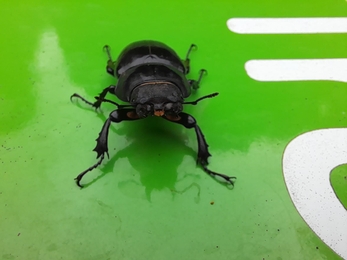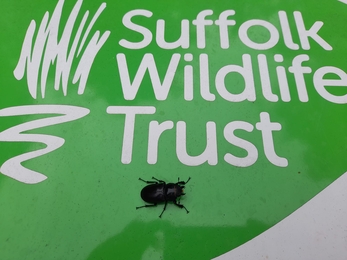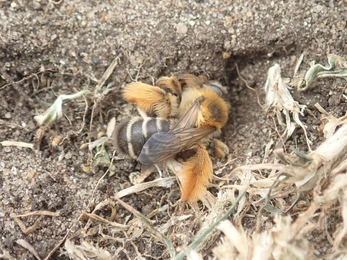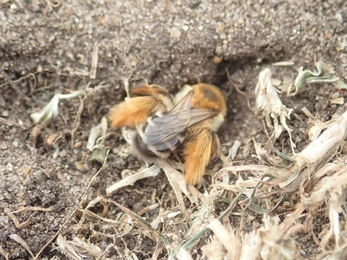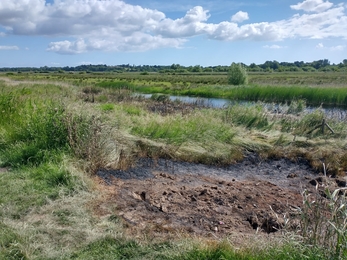Weekly wild news from our reserves - 1 July 2022
Pantaloon bee at Lackford Lakes - Hawk Honey
Warden Joe snapped this female stag beetle which was taking a rest on his van. Female stag beetles look similar to lesser stag beetles, but are larger, with smaller heads and brown wing cases instead of black ones. Male stag beetles are unmistakable with their massive antler-like jaws and reddish-brown bodies.
Stag beetles are increasingly under pressure from the loss of dead and decaying wood habitat meaning that private gardens and community green spaces are becoming even more important as safe havens. Creating a log pile can provide stag beetle habitat. A log pile can either be a stack of logs laid horizontally or else upright logs which are partially buried. Partially burying logs in the soil is preferable because it will retain more moisture and increase the number of visiting insects.
If you find a stag beetle, please record your find with Suffolk Biodiversity Information Service
Rare wasp discoveries
Lackford Lakes Visitor Officer and entomologist Hawk discovered some exciting wasps at the reserve this week. Firstly, a parasitic wasp which was a species of Podalonia (pictured below). Podalonia wasps nest in sand or dry soil and are parasites of moth caterpillars. Hawk’s second discovery was a yellow-spotted sapyga wasp (Monosapyga clavicornis) which is a cleptoparasite of bees in bee hotels – this wasp hasn’t been recorded at Lackford for 98 years!
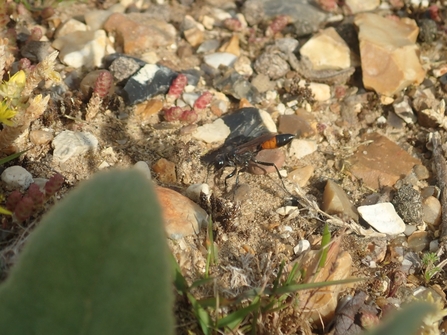
Parasitic wasp of Podalonia species which is a first for Lackford Lakes - Hawk Honey
Eel escape
This heron was caught on trail cam at Dingle Marshes getting in a bit of a tangle with an eel, which manged to wriggle free. We wonder what happened next...
Improved access
Our wonderful volunteers at Bradfield Woods have been working hard installing this great new access ramp to the centre.
Amber snail
Warden Jamie spotted this lovely amber snail succinea putris at Church Farm. This species of snail is common in damp, well vegetated areas like riverbanks and marshes.
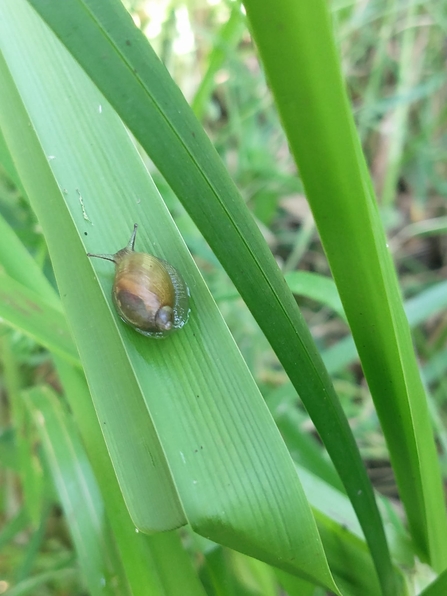
Amber snail – Jamie Smith
Bee trousers
Pantaloon bees have been emerging from their burrows at Lackford Lakes this week. The pantaloon bee gets its name from the female’s large pollen brushes which are used to excavate their burrows and look like orange trousers. This bee only takes pollen from plants in the aster family such as ragwort.
Dryad’s saddle
This massive Dryad's saddle fungus is thriving on decaying ash at Arger Fen. The cap surface is pale cream/golden and has the most beautiful pattern of brown scales on top, which gives it its other nickname 'pheasants back'. The underside of the fruiting body has hundreds of honeycomb shaped pores. Some fungi have the most unusual smells, and this fungus is no exception -it smells of watermelon!
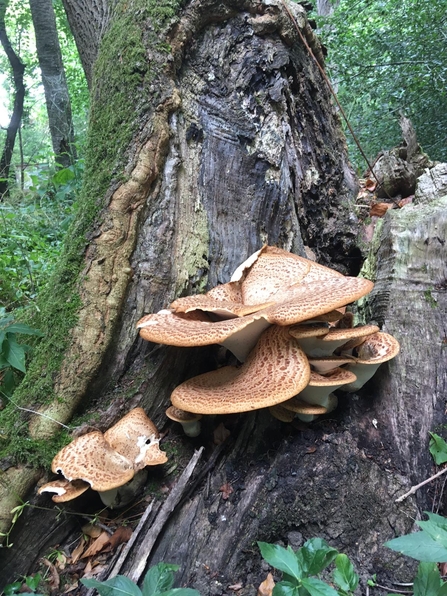
Dryads saddle - Will Cranstoun
Pew with a view
Warden Andy and team installed this smart new bench at Lound Lakes this week – what a wonderful view!
Vandalism at Carlton Marshes
Since the devastating loss of our viewing platform at Oulton Marshes due to a barbecue fire, there has been a spate of problems with anti-social behaviour and vandalism over the last fortnight. The team have been forced to close the hides, as they have been broken into and damaged on several occasions. Site Manager Matt and Lowestoft Police are also making night-time patrols of the reserve.
Site Manager Matt said, "obviously, with locking up the hides following this damage, all the photographers and birders down there are losing out as they have not been able to access the hides. There is no one more disappointed in this behaviour than me and my team. At Suffolk Wildlife Trust we are continually each day not being able to get on with our jobs of managing the nature reserve as we're having to monitor the site and ensure it is secure. By upping patrols and taking staff away from their roles, as a conservation charity, it is a real pull on resources. These youths need to be spoken to, so it is about patrols as the habit needs to be broken."


